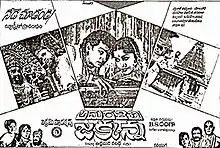Amara Silpi Jakkanna
Amara Silpi Jakkanna is a 1964 Telugu-language biographical film, produced and directed by veteran B. S. Ranga under the Vikram Studios banner. It stars Akkineni Nageswara Rao, B. Saroja Devi and music composed by S. Rajeswara Rao. Thespian Akkineni Nageswara Rao enacted the role of Amara Silpi Jakkanna, known for sculpting Kalyani Chalukyas and Hoysalas. This film is the first Eastmancolor production of Telugu cinema.[1][2] In the song "Malligeya Hoovinantha", Jayalalithaa danced and the song is hailed as classic till date. This movie is a remake of director's own Kannada movie Amarashilpi Jakkanachari.[3]
| Amara Silpi Jakkanna | |
|---|---|
 Theatrical release poster | |
| Directed by | B. S. Ranga |
| Produced by | B. S. Ranga |
| Written by | Samudrala (dialogues) |
| Screenplay by | B. S. Ranga |
| Starring | Akkineni Nageswara Rao B. Saroja Devi |
| Music by | S. Rajeswara Rao |
| Cinematography | B. S. Ranga |
| Edited by | P. J. Mohan M. Devendra Nath Chakrapani |
Production company | Vikram Studios |
| Distributed by | Navayuga Films |
Release date | |
Running time | 165 mins |
| Country | India |
| Language | Telugu |
Plot
There existed a great sculptor named Mallanna (Nagaiah) in the current day of Karnataka region. His son Jakkanna (ANR) inherits these qualities from his father and becomes a great sculptor by the time he reaches young age. He spends most of the time in between stones and dreams of making them into great sculptures. It is at this moment he falls in love with a dancer named Manjari (B. Saroja), a breathtakingly beautiful woman and a great dancer. They appreciate each other's art and get married. When things go on a relaxed pace, the king Gopadevudu (Udayakumar) lusts for Manjari. In dramatic circumstances, Manjari happens to dance in the court of Gopadevudu. Seeing that, Jakkanna is left heartbroken. He starts suspecting Manjari and establishes a huge temple compound. With severe sadness, Jakkanna leaves to an unknown location in grief. He tries to tell people not to love or fall for a woman and gets abuses in return. It is when Bhagawan Ramanujacharya (Dhulipalla) rescues Jakkanna and takes him towards the direction of service to God. Jakkanna rightfully follows the path and dedicates himself to make beautiful temples. Meanwhile, Manjari who is already pregnant attempts suicide because her husband left him. She is rescued by fishermen (Relangi, Girija) and delivers a baby boy. She names the son Dankana (Haranath). Dankana trains under his grandfather Mallanna and becomes a great sculptor. Vishnuvardhana (Kannada Narasimha Raju), the Emperor of Hoyasala makes a huge temple in Belur on the advice of Ramanujacharya. Dramatically, Jakanna and Dankana meet there. However, they don't realize that they are father and son respectively. Dankana points out a flaw in a brilliantly made sculpture by Jakkanna in public. Jakkanna takes the challenge and when Dankana hits the sculpture with a hammer, a frog comes out of it. Jakkanna immediately chops his arms off. Manjari reaches then and gets sad to see her husband and son. After the prayers in Belur temple in the presence of Ramanujacharya, Jakkanna gets back his hands. The family reunites. Jakkanna gets the title Amarasilpi, thereby making history.
Cast
- Akkineni Nageswara Rao as Jakkannacharya
- B. Saroja Devi as Manjari
- Chittor V. Nagaiah as Mallanna
- Haranath as Dankanna
- Udaya Kumar as Gopadevudu
- Dhulipala as Ramanuja Charya
- Relangi as Sundaram
- A. V. Subba Rao as Vishnu Vardhanudu
- Suryakantham as Rajamma
- Girija as Gangu
- Pushpavalli as Shanthala
- Jayalalithaa as Dancer
Soundtrack
| Amara Shilpi Jakkanna | |
|---|---|
| Film score by | |
| Released | 1963 |
| Genre | Soundtrack |
| Length | 34:15 |
| Producer | S. Rajeswara Rao |
Music composed by S. Rajeswara Rao. Music released on Audio Company.
| S. No. | Song Title | Lyrics | Singers | length |
|---|---|---|---|---|
| 1 | "Ee Nallani Raallalo" | C. Narayana Reddy | Ghantasala | 3:46 |
| 2 | "Andhaala Bommatho" | Dasaradhi | P. Susheela | 3:20 |
| 3 | "Manase Vikasincheraa" | Dasaradhi | Ghantasala, P. Susheela | 4:44 |
| 4 | "Murisevu Virisevu" | Samudrala | Ghantasala | 4:02 |
| 5 | "Nagumomu Choopinchavaa" | C. Narayana Reddy | P. Susheela | 3:38 |
| 6 | "Niluvumaa Niluvumaa" | Samudrala | Ghantasala, P. Susheela | 3:12 |
| 7 | "Yechatikoyi Nee Payanam" | Dasaradhi | Ghantasala | 3:31 |
| 8 | "Yedho Yedho" | C. Narayana Reddy | Ghantasala, P. Susheela | 3:52 |
| 9 | "Tharamaa Varadhaa" | Samudrala | Ghantasala, P. Susheela | 4:10 |
References
- Amarshilpi Jakanna (1964) – IMDb
- "Amarasilpi Jakkanna (1964) – Telugu Movie | Chitralu.com". Archived from the original on 4 March 2014. Retrieved 23 March 2014.
- "Archived copy". Archived from the original on 1 July 2018. Retrieved 1 July 2018.CS1 maint: archived copy as title (link)
- "11th National Film Awards". International Film Festival of India. Archived from the original on 2 May 2017. Retrieved 13 September 2011.